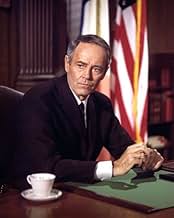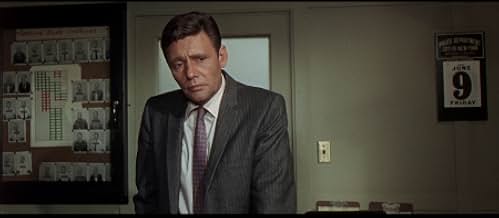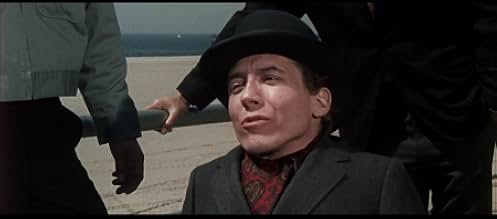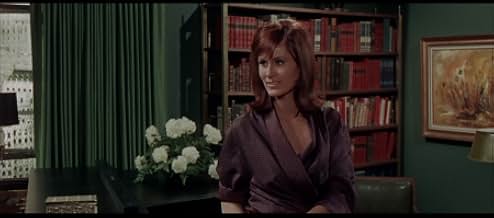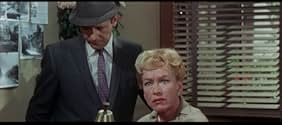AVALIAÇÃO DA IMDb
6,5/10
4,3 mil
SUA AVALIAÇÃO
No Harlem espanhol de Nova York, os detetives Madigan e Bonaro têm 72 horas, estipuladas por seus superiores, para capturar um bandido procurado por homicídio no Brooklyn.No Harlem espanhol de Nova York, os detetives Madigan e Bonaro têm 72 horas, estipuladas por seus superiores, para capturar um bandido procurado por homicídio no Brooklyn.No Harlem espanhol de Nova York, os detetives Madigan e Bonaro têm 72 horas, estipuladas por seus superiores, para capturar um bandido procurado por homicídio no Brooklyn.
- Direção
- Roteiristas
- Artistas
- Direção
- Roteiristas
- Elenco e equipe completos
- Produção, bilheteria e muito mais no IMDbPro
Avaliações em destaque
Detective Daniel Madigan (Richard Widmark) and Detective Rocco Bonaro (Harry Guardino) enter a squalid Manhattan apartment building to pick up Barney Benesch (Steve Ihnat), who is wanted for questioning on a case in Brooklyn. When Benesch manages to take Madigan and Bonaro's guns away and escape, Police Commissioner Anthony X Russell (Henry Fonda) tells them that they have 72 hours to get Benesch back, or else.
Out of all of the Don Siegel-directed films I've seen to date, this was the biggest disappointment. The film begins and ends with fantastic action sequences--well directed, well shot, with a nice, gritty feel, but in between the film felt overlong, overly complex, and far too soap-opera-like for my tastes.
It could be due to Madigan being adapted from a novel, but Abraham Polonsky and Howard Rodman's ("Henri Simoun" here) script includes so many different threads, most of them inconsequential to the outcome of the film, that it almost begins to lose coherence in the middle. It's a bad sign when the major arc of the story is completed, but characters still have to engage in a number of "But what about so and so?" verbal tags at the end of the film to try to satisfy the audience.
It feels almost as if Madigan is made for two entirely different crowds--one, fans of gritty crime action films, and the other, fans of realist dramas cum soap operas. I can't imagine the former caring about most of the material in the middle (unless it had a pay off towards their genre), and I can't imagine the latter being interested in the action scenes. Most of the material in the middle, although it has some more than admirable dialogue and decent performances, hinges on a complex web of personal and professional relationships--various romantic affairs, questionable relations between the police and citizens, and so on. It all comes to naught in the end. Also not helping is Henry Fonda's odd aloofness. Again, it might work if it had some other payoff, but it doesn't.
Still, the positive aspects were good enough to not bring my score below a 6. The film might also play better on a second viewing, where you better know how to adjust your expectations as it goes along. On a first, uninformed viewing, the beginning is likely to gear you up for a great, suspenseful and witty ride, leaving you disappointed in the middle, until you finally adjust and then you're awakened again with action at the end.
Out of all of the Don Siegel-directed films I've seen to date, this was the biggest disappointment. The film begins and ends with fantastic action sequences--well directed, well shot, with a nice, gritty feel, but in between the film felt overlong, overly complex, and far too soap-opera-like for my tastes.
It could be due to Madigan being adapted from a novel, but Abraham Polonsky and Howard Rodman's ("Henri Simoun" here) script includes so many different threads, most of them inconsequential to the outcome of the film, that it almost begins to lose coherence in the middle. It's a bad sign when the major arc of the story is completed, but characters still have to engage in a number of "But what about so and so?" verbal tags at the end of the film to try to satisfy the audience.
It feels almost as if Madigan is made for two entirely different crowds--one, fans of gritty crime action films, and the other, fans of realist dramas cum soap operas. I can't imagine the former caring about most of the material in the middle (unless it had a pay off towards their genre), and I can't imagine the latter being interested in the action scenes. Most of the material in the middle, although it has some more than admirable dialogue and decent performances, hinges on a complex web of personal and professional relationships--various romantic affairs, questionable relations between the police and citizens, and so on. It all comes to naught in the end. Also not helping is Henry Fonda's odd aloofness. Again, it might work if it had some other payoff, but it doesn't.
Still, the positive aspects were good enough to not bring my score below a 6. The film might also play better on a second viewing, where you better know how to adjust your expectations as it goes along. On a first, uninformed viewing, the beginning is likely to gear you up for a great, suspenseful and witty ride, leaving you disappointed in the middle, until you finally adjust and then you're awakened again with action at the end.
Detective Daniel Madigan (the excellent Richard Widmark) is very efficient and experienced, but also has no ethics. His partner, Detective Rocco Bonaro (Harry Guardino), and him go to a hotel room for the simple arrest of the small-time bandit Barney Benesch (Steve Ihnat). Madigan is reckless and in a lack of attention on Benesch, he reacts, takes the guns of the detectives and escapes. When back to the precinct, they receive the information that Benesch is a killer. Commissioner Anthony X.Russel (Henry Fonda), a very rigid and moralist man, gives a schedule of three days maximum for the detectives to arrest Benesch. Yesterday it was the first time that I watched this excellent police-drama movie. In the present days, this movie is politically incorrect: Madigan has no ethics, most of the characters have affair with lovers, smoking is `in', the interrogation is rough without human rights, and this is one of the greatest points of this film, since it is very real. Further, Don Siegel does not need car chases, explosions and other special effects to hook the attention of the viewer. The direction, screenplay and performance of the actors and actresses are more than enough to satisfy the viewer. The characters are very well developed and the scenes are very realistic. Again, an excellent police-drama movie recommended for those who like police story. My vote is eight.
Title (Brazil): ` Os Impiedosos' (`The Unmerciful')
Title (Brazil): ` Os Impiedosos' (`The Unmerciful')
This is a very "late '60s" detective drama, and if you're in the mood, it will hit the spot.
What struck me, and it has not been picked up by other posters, is the very visible difference between the majority of the scenes, shot on authentic NYC locations, and a few scenes straight from the Universal backlot, on urbanistically nonsensical streets with no gutters.
The studio shot scenes (and the school-of-Lalo-Shifrin score) increase the impression that you are watching a first class TV movie. It all makes you hungry for a dinner in a foil tray.
Definitely entertaining, in a period way.
What struck me, and it has not been picked up by other posters, is the very visible difference between the majority of the scenes, shot on authentic NYC locations, and a few scenes straight from the Universal backlot, on urbanistically nonsensical streets with no gutters.
The studio shot scenes (and the school-of-Lalo-Shifrin score) increase the impression that you are watching a first class TV movie. It all makes you hungry for a dinner in a foil tray.
Definitely entertaining, in a period way.
A decent exploration of the maverick detective theme that Siegal would examine more successfully in "Dirty Harry." Richard Widmark is terrific in the title role, and the cinematography, along with some of the dialogue, is top notch. The film runs into problems, however, with the subplot involving police commissioner Henry Fonda, as well as Madigan's difficulties on the homefront with wife Inger Stevens. Had the emphasis remained on the manhunt conducted by Madigan and his partner (Harry Guardino), it could have been a classic. Instead, too much time is devoted to talk, and as any Siegal enthusiast knows, action is what he did best. The later TV series, again starring Widmark, is superior.
Directed by Don Siegel who had a foot firmly planted in classic Hollywood and who was also a trailblazer in modernizing American action films, "Madigan" serves the perfect bridge between the two. Co-written by Abraham Polonsky, who'd previously been on the Hollywood Blacklist for refusing to testify before the House Un-American Activities Committee, the film follows two different NYPD police officers. One is Madigan, a tough no-nonsense detective played by Richard Widmark trying to catch a killer, and the other is the straight-arrow police commissioner, Henry Fonda, who's balancing justice, politics, and an extra-marital affair. The film was based on a book titled "The Commissioner" and Fonda's character was the original focus of the story, but the producers instead changed the focus to Widmark's Madigan character, so the film unfortunately ends up a an odd combination of two different stories. Both Fonda and Widmark's stories involve them having to balance their work-life and home-life, but neither of those story elements seemed all that interesting. The most interesting part of the story concerned Widmark and his partner, Harry Guardino, on the trail of criminal Steve Ihnat. Watching Widmark and Guardino push the boundaries of acceptable law enforcement in their investigation makes this film an interesting bridge to director Don Siegel's controversial and highly influential vigilante cop film "Dirty Harry" he'd make a few years later. Siegel also makes great use of NYC locations that give ether film added grit and realism, much like we'd later see in William Friedkin's "The French Connection" and Siegel's use of San Francisco in "Dirty Harry." Siegel also skillfully demonstrates his own directional action sequences chops with a memorable showdown in the film's finale, which features with three characters in tight quarters, all with John Woo-style double-fisted pistols in each hand. Overall, "Madigan" features an old style police detective story (with a nice plot nod to Kurosawa's "Stray Dog") that abandons the stylistic German Expressionist roots of American film noir and instead takes the genre into new more realistic and gritty of territory, even if those stronger elements get somewhat undone by dull and unoriginal subplots involving the marital lives of Madigan and the commissioner.
Você sabia?
- CuriosidadesAfter years of rejecting offers to star in a TV series, Richard Widmark finally succumbed to Universal and NBC-TV's offer for a series. The pilot, Brock's Last Case (1973). was rejected, however, and Widmark was asked to play Madigan in a segment of the NBC Wednesday Mystery Movie during the 1972-73 season. The series was canceled after one season despite usually finishing in the top 30 of the Nielsen ratings.
- Erros de gravaçãoWhen the killer is located in a hotel room, the police mass in view of the window rather than around the other side of the building. Then while the killer is firing from the window the assault group run into the building on the side under fire from the window. They evacuate the floor of the killer's room well after the first shots are exchanged and no police are watching the door to prevent escape.
- Citações
Commissioner Anthony X. Russell: [after Kane drops his shield on Russell's desk] What am I supposed to do with that?
Chief Inspector Charles Kane: Commissioner, I thought you'd never ask.
- ConexõesFeatured in Marcas do Destino (1985)
Principais escolhas
Faça login para avaliar e ver a lista de recomendações personalizadas
- How long is Madigan?Fornecido pela Alexa
Detalhes
- Data de lançamento
- País de origem
- Idioma
- Também conhecido como
- Madigan
- Locações de filme
- 107 East 98th Street, Manhattan, Nova Iorque, Nova Iorque, EUA(Barney Benesch's sleazy residence; area of first chase scene)
- Empresa de produção
- Consulte mais créditos da empresa na IMDbPro
- Tempo de duração
- 1 h 41 min(101 min)
- Cor
- Proporção
- 2.35 : 1
Contribua para esta página
Sugerir uma alteração ou adicionar conteúdo ausente


